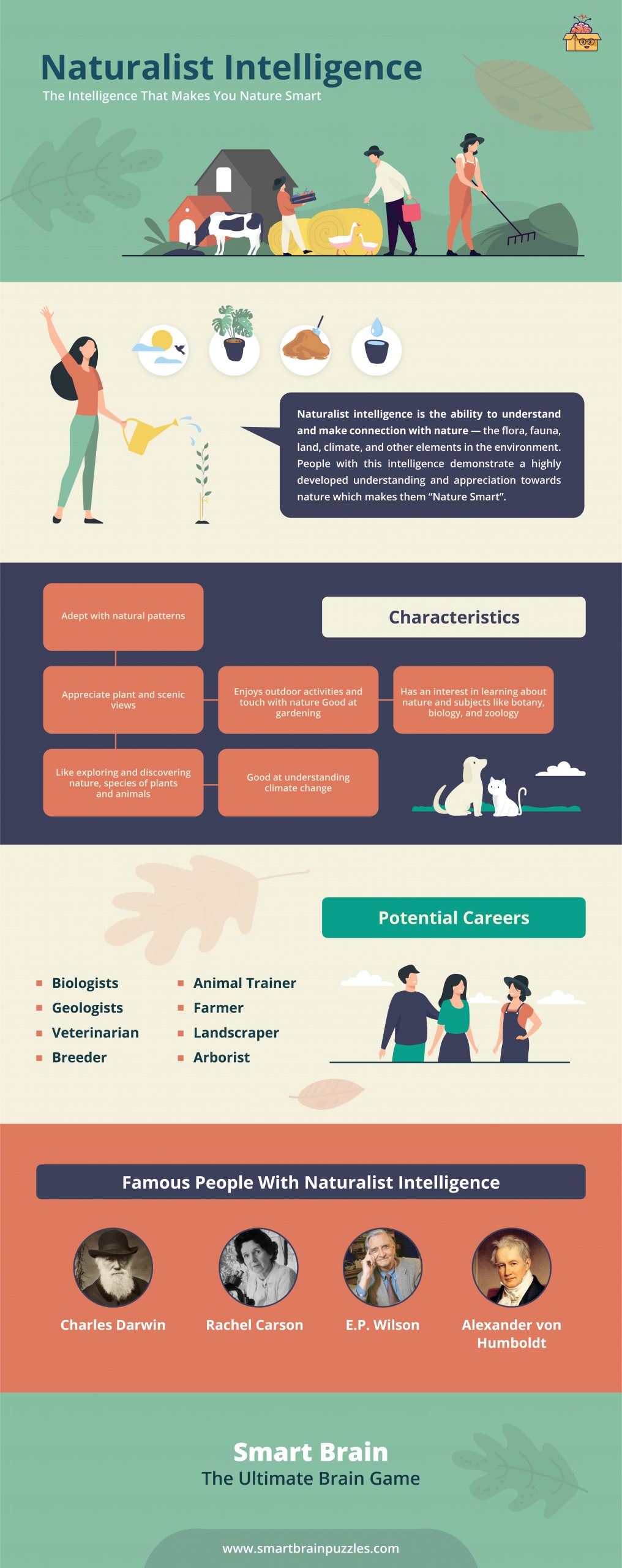-
Naturalist Intelligence – The Intelligence That Makes You Nature Smart

Naturalist intelligence is the ability to recognize and classify different species of plants and animals in the environment. People with this intelligence demonstrate a highly developed understanding and appreciation towards nature which makes them “Nature Smart”. It is one of the multiple intelligences as per the theory proposed by Howard Gardner. Let’s understand it in detail.
Background: In 1983, Howard Gardner introduced multiple intelligence theory in his book Frames of Minds. He questioned the old notion of intelligence that described it as a single entity as in an IQ Score. He classified human intellectual competence into 7 different types: Visual-spatial, verbal-linguistic, musical-rhythmic, logical-mathematical, interpersonal intelligence, intrapersonal intelligence, and bodily-kinesthetic intelligence to demonstrate the full range of human intelligence.
Since then the theory has been widely accepted and became a guiding mechanism for understanding cognitive abilities.
And 12 years after his seminal work, he added the new candidate to the list which he believed to have enough evidence and fulfill the criteria for multiple intelligence. This was Naturalist intelligence, the intelligence that makes human nature smart.
What Exactly is Naturalist Intelligence?
Naturalist intelligence deals with understanding and making connections with nature — the flora, fauna, land, climate, and other elements in the environment. This intelligence gives a highly developed sense of nature that makes people “nature smart.”
People with naturalist intelligence have an enhanced interest and affinity towards different species of plants and animals, their behavior, habitats, and habits. They are avidly conscious of the changes in their climate and surrounding. They can easily recognize patterns, similarities, differences, and changes in their environment better than others.
It is considered that humans developed naturalist intelligence during primitive times when recognizing the species of plants and animals, understanding climate and land was inevitable to survival. This gives it an evolutionary and developmental history — two of the criteria that fulfill it as human intelligence.
Characteristics of People With Naturalist Intelligence
The very term “naturalist” describes the characteristics of this intelligence. Though the core characteristics of naturalist remain the same — avid understanding of nature — different cultures and orientations give it a broader view.
As per Gardner, in some cultures, people who understand different species, know which are useful and dangerous, and even categorize new and unfamiliar ones are naturalists. These people have no formal education about nature but are skilled in applying the prevailing cultural and folk taxonomies.
But when considering scientific orientation, naturalists can be biologists who recognize formally accepted species. And in western culture, a naturalist is a person with an expansive knowledge of the living world. So the attributes of naturalistic intelligence can be different. But here are some of the common characteristics that you could find in naturalist people.
- Adept with natural patterns
- Appreciate plant and scenic views
- Enjoys outdoor activities and touch with nature
- Good at gardening
- Has an interest in learning about nature and subjects like botany, biology, and zoology
- Like exploring and discovering nature, species of plants and animals
- Good at understanding climate change
Further, these characteristics and skills open opportunities for specific careers. Thus people with high naturalistic intelligence are fit for professions such as:
- Biologists
- Geologists
- Veterinarian
- Breeder
- Animal Trainer
- Farmer
- Landscraper
- Arborist
Examples of Famous People With High Naturalist Intelligence
Gardner gives examples of scholars who are an epitome of naturalistic intelligence. This includes Charles Darvin, Rachel Carson, E.P. Wilson, and Alexander von Humboldt
Charles Darvin: The most renowned naturalist and evolutionary theorist whose work became the foundation of modern evolutionary studies. Interestingly he considered himself as a “born a naturalist.”
Rachel Carson: A marine biologist who contributed notable work on the natural history of the sea and on environmental pollution. She has also been credited as one of the pioneers of the global environmental movement. Rachel developed a deep interest in nature in her early life.
O. Wilson: The American biologist is known to be the world’s leading expert on ants. He’s also renowned for his work on sociobiology that studies the genetic behavior of animals.
Alexander von Humboldt: He was a naturalist, explorer, and the first person to suggest that humans are affecting nature and causing climate change. He’s a major figure in earth sciences and ecology.
Wrapping Up
Naturalistic intelligence truly depicts facets of human’s multiple intellectual competencies. This intelligence holds its roots in evolutionary history where survival was dependent on the understanding, discriminating, utilizing, and avoiding different species of plants and animals. Still today the role of naturalist intelligence is important for understanding, utilizing, and preserving nature in professions like farming, gardening, zoology, etc. And with this, Gardner again proves that human cognitive capabilities are more than just an IQ score.

Since You’re Here —
If you are looking for a better way to spend time on your phone and work on your brain muscle, SMart Brain is what you need. A RIDICULOUSLY FUN GAME with 200+ levels of logic, math, creative thinking, word puzzles, and more.
Download Now For FREE
 8538
8538







